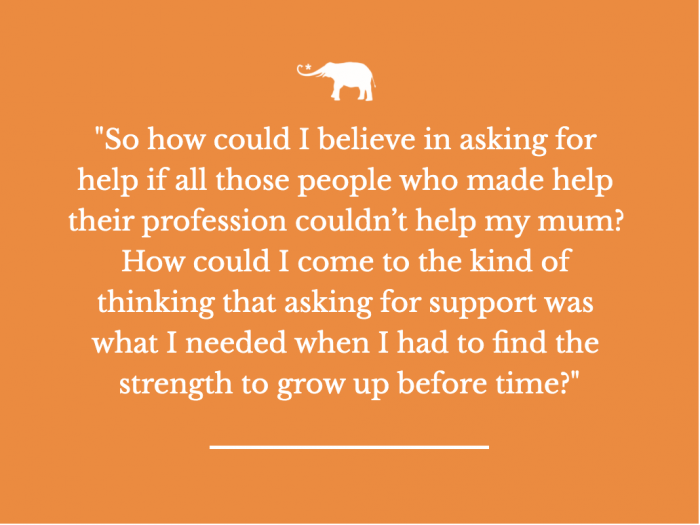View this post on Instagram
“In real pain, we have no other choice but to learn to ask for help and on a daily basis. Pain tells us we belong and cannot live forever alone or in isolation. Pain makes us understand reciprocation.” ~ David Whyte
It was dark and foggy. My house was broken into. I was being pulled by my legs and dragged on the floor in the middle of the night.
My voice betrayed me as I tried to scream to wake up from this nightmare, or others I had nearly every night.
That’s how I spent most of my 20s: at night wading through the bogs of my dreams, my days a headland of normality. The transition between here and there is combed by an invisible hand.
As I neared my 30th birthday, I happened to be sitting with a friend one day after a dance class on a bench in Arlozorov Street in Tel Aviv. As we ate a sandwich in the bright, midday sun, I drank in her stories about her latest appointment with her psychologist. How she helped her with her pain, how she took her by the hand and taught her to see a brighter landscape for her life.
I never thought of asking for help because I didn’t think I needed it. Aren’t nightmares just normal things that happen to everyone?
You see, when I was a child, I accompanied my mum many times to her meetings with her psychologist in Tel-Hashomer hospital, and then to meetings with her social worker in that big, grey building right at the center of town, and then to meetings with her psychiatrist, Dr. Weinstein, who gave her prescriptions for medication with encouraging smiles. But still, she got up and left in the middle of the night when I was 16, without notice, without a goodbye, leaving me to take care of my little sister with a belly full of fear.
So how could I believe in asking for help if all those people who made help their profession couldn’t help my mum? How could I come to the kind of thinking that asking for support was what I needed when I had to find the strength to grow up before time?
Many of us have their own stories of growing up before time, of not receiving the support they needed from their caregivers, of seeing their parents struggle to get by on their own, of seeing how the social, economic, and political structures they grew up in did not provide the help they needed. Those stories sear our hearts and wane the muscles of the energy to ask for help.
Asking for help can feel so tender and vulnerable. Sometimes it takes such an effort to face the fear of being rejected or disappointed, the feelings of shame that come with it, that we prefer to stow our needs neatly away, enlisting whatever conviction we can muster to just keep moving forward.
And yet, asking for help is an instinct we are born with. As babies, we will do anything necessary to raise our surroundings’ attention to our needs. A baby’s cry is an uncompromising force when they’re hungry. Their smile when they need contact and attention transform our agony and concerns. Their hands are compelled to stretch forward and touch the world around them.
This instinct is not gone; it is simply buried under the weight of painful experiences and can be excavated with the power of loving awareness.
Often, our growth is a process of unlearning, undoing, and unbecoming, stretching out with our heart to ring the doorbell of our instinctual, intuitive nature, so we can expand beyond conditioning.
1. Starting again.
Your body knows how to ask for help. If you begin to pay attention to the way your body does it through the smallest of gestures, such as getting hungry or thirsty, needing to take rest, going to sleep, desiring touch, or needing to speak your truth, you’ll reconnect with that ignition of asking for help.
In the subtlety of attuning and listening, you’re touching the wisdom of asking that dwells naturally within your body.
Asking for help, whether from a loved one or from professionals, doesn’t come intuitively when that quality of the subtle body connection is parched. Attention is a gesture of satiation—of watering the numb, the denied, and the contracted into mellifluence.
In moments of getting lost in our pain and confusion, it’s difficult to take big strides in new ways of being. We yearn for something simple and comforting, like the feather of compassion. When we train our attention to be awake to the subtle messages of our bodies in times of relative stability and relaxation, those ask-for-help muscles will flex more intuitively when we need them.
2. Practicing active receptivity.
Asking and receiving, waking up and falling asleep, and inhaling and exhaling are the duets we use to dance with life’s undulating motions. Perhaps it can be magical to always be ready to be loved, always be energised and primed for action, and always be grateful and giving. But the truth of our capacity comes to visit us daily, like a faithful waxing and waning moon. To be able to ask for help, we also need to be able to receive.
We can go through a lifetime without noticing how much effort our body puts into breathing. In an inhale, the muscles of the throat expand their airways, the right side of the heart needs to be ready to pick up the oxygen and move it into the lungs, the ribcage grows to make room, and the diaphragm pushes on the abdomen. Receptivity, in its essence, is active.
Active receptivity harmonises the gesture of asking for help. Here, too, you can start from whatever feels safe and immediate. It can look like acknowledging your need for rest and taking a step back from doing. It can look like opening the window to take in the spring’s fresh fragrances. It can look like a “thank you” as a full sentence for a complement. It can look like playing with a child. It can look like laying a blanket on the soft grass to allow the sun to stroke your body.
The most important thing about active receptivity is to not lose the grip of your need for support and help.
3. Letting go of control.
After I started working with my friend’s psychologist, I realised that not asking for help was a form of control. Inside, I was falling apart. Any vestige of asking for help meant I’d have to divulge the effort I’m putting in just to hold the pieces together.
If there’s anything to harvest from my avoidance in asking for help, it is that help can be found in many shapes and forms. If you haven’t found yet the one who brings you closer to yourself, if you haven’t found the form of help that heals your deepest wounds, take rest in a shady spot like you would on a journey. Gather your energies, and when you’re ready, ask again.
Asking, like inhaling, is a form of repetitive and cyclical coming to life.
What are your strategies to avoid the request for help? Pretending the pain is not there, normalising it, suppressing the feelings and wearing a smile on your face, working harder and trying harder, telling yourself it’s not that serious, telling yourself it’s not that urgent, convincing yourself you can wait it out, or pressuring yourself to “just accept it” are just a few of the many creative strategies we employ to minimise the truth of our needs.
Sometimes, the best medicine comes from not accepting. Sometimes, the most healing effect comes from taking your needs—all of your needs, seriously.
Sometimes, we wake up to the capacity to ask for help by simply naming our own strategy for avoiding asking for what we need. We name it, again and again, each time it appears. Like a drop of water, this too can penetrate the walls crowning your needs.
I believe we all want to live in a culture of care where help is available for any budget, race, caste, and gender, and where asking is natural and free from shaming. Where heroism is not defined by toughing it out and individualism does not compete for importance with community.
I believe that learning how to ask for help builds that kind of culture, one heart at a time.







Read 0 comments and reply